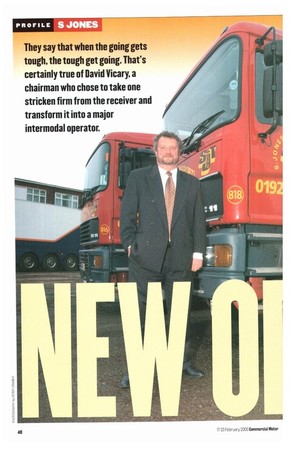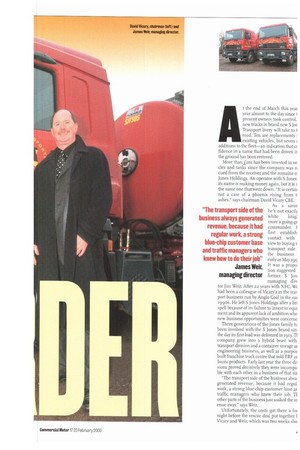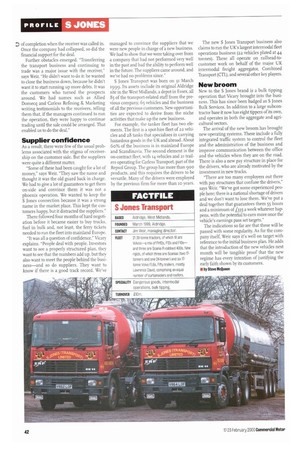They say that when the going gets tough, the tough
Page 42

Page 43

Page 44

If you've noticed an error in this article please click here to report it so we can fix it.
get going. That's certainly true of David Vicary, a chairman who chose to take one stricken firm from the receiver and transform it into a major intermodal operator.
At the end of March this year year almost to the day since t present owners took control, new trucks in brand new S Jor Transport livery will take to t road. Ten are replacements I existing vehides, but seven additions to the fleet—an indication that a fidence in a name that had been driven ir the ground has been restored.
More than £2m has been invested in ve des and tanks since the company was n cued from the receiver and the remains a /ones Holdings. An operator with S Jones its name is making money again, but it is r the same one that went down. "It is certait not a case of a phoenix rising from t ashes," says chairman David Vicary CBE.
As a savio he's not exactly
white knigl more a going-gr commander. I first establish contact with view to buying t transport side the business early as May 19s It was a propo tion suggested former S Jon managing dir( tor Jim Weir. After 22 years with NFC, W( had been a colleague of Vicary's in the trar port business run by Anglo Coal in the eat 1990s. He left S Jones Holdings after a bri spell because of its failure to invest in equi ment and its apparent lack of ambition whe new business opportunities were conceme
Three generations of the Jones family h; been involved with the S Jones brand sin. the day its first load was delivered in 1913. TI company grew into a hybrid beast with transport division and a container storage ar engineering business, as well as a purpos built franchise truck centre that sold ERF at Isuzu products. Early last year the three dil sions proved decisively they were incompa ble with each other in a business of that siz "The transport side of the business alwa' generated revenue, because it had reg-ul work, a strong blue-chip customer base ar traffic managers who knew their job. T1 other parts of the business just soaked the re enue away," says Weir.
Unfortunately, the costs got there a foi night before the rescue deal put together l Vicary and Weir, which was two weeks sho
The transport side of the business always generated revenue, because it had regular work, a strong blue-chip customer base and traffic managers who knew how to do their job" James Weir, managing director
3 of completion when the receiver was called in. Once the company had collapsed, so did the financial support for the deal.
Further obstacles emerged. "Transferring the transport business and continuing to trade was a major issue with the receiver," says Weir. "He didn't want to do it: he wanted to close the business down, because he didn't want it to start running up more debts. It was the customers who turned the prospects around. We had names such as Allied Domecq and Carless Refining & Marketing writing testimonials to the receivers, telling them that, if the managers continued to run the operation, they were happy to continue trading until the sale could be arranged. That enabled us to do the deal."
Supplier confidence
As a result, there were few of the usual problems associated with the stigma of receivership on the customer side. But the suppliers were quite a different matter "Some of these had been caught for a lot of money," says Weir. "They saw the name and thought it was the old guard back in charge. We had to give a lot of guarantees to get them on-side and convince them it was not a phoenix operation. We wanted to keep the S Jones connection because it was a strong name in the market place. This kept the customers happy, but it distracted the suppliers."
There followed four months of hard negotiation before it became easier to buy trucks, fuel in bulk and, not least, the ferry tickets needed to run the fleet into mainland Europe.
"It was all a question of confidence," Vicary explains. "People deal with people. Investors want to see a properly structured plan, they want to see that the numbers add up, but they also want to meet the people behind the business—and so do suppliers. They want to know if there is a good track record. We've managed to convince the suppliers that we were new people in charge of a new business. We had to show that we were taking over from a company that had not performed very well in the past and had the ability to perform well in the future. The suppliers came around, and we've had no problems since."
S Jones Transport was born on 3T March 1999. Its assets include its original Aldridge site in the West Midlands, a depot in Essex, all 85 of the transport-related staff from the previous company, 65 vehicles and the business of all the previous customers. New opportunities are expected to derive from the niche activities that make up the new business.
For example, the tanker fleet has two elements. The first is a spot-hire fleet of 22 vehicles and 28 tanks that specialises in carrying hazardous goods in the U K and abroad. About 6o% of the business is in mainland Europe and Scandinavia. The second element is the on-contract fleet, with 14 vehicles and 21 trailers operating for Carless Transport, part of the Repsol Group. The group has more than 900 products, and this requires the drivers to be versatile. Many of the drivers were employed by the previous firm for more than ro years.
The new S Jones Transport business also claims to run the UK's largest intermodal fleet operations business (22 vehicles plated at 44 tonnes). These all operate on railhead-tocustomer work on behalf of the major UK intermodal freight aggregator, Combined Transport (CU), and several other key players.
New broom
New to the S Jones brand is a bulk tipping operation that Vicary brought into the business. This has since been badged as S Jones Bulk Services. In addition to a large subcontractor base it now has eight tippers of its own, and operates in both the aggregate and agricultural sectors.
The arrival of the new broom has brought new operating systems. These include a fully integrated traffic system to control the fleet and the administration of the business and improve communication between the office and the vehicles when they are on the road. There is also a new pay structure in place for the drivers, who are already motivated by the investment in new trucks.
"There are too many employers out there with pay structures that confuse the drivers," says Weir. "We've got some experienced people here; there is a national shortage of drivers and we don't want to lose them. We've put a deal together that guarantees them 55 hours and a minimum of L335 a week whatever happens, with the potential to earn more once the vehicle's earnings pass set targets."
The indications so far are that these will be passed with some regularity. As for the company itself, Weir says it's well on target with reference to the initial business plan. He adds that the introduction of the new vehicles next month will be tangible proof that the new regime has every intention of justifying the early faith shown by its customers.
• by Steve McQueen








































































































